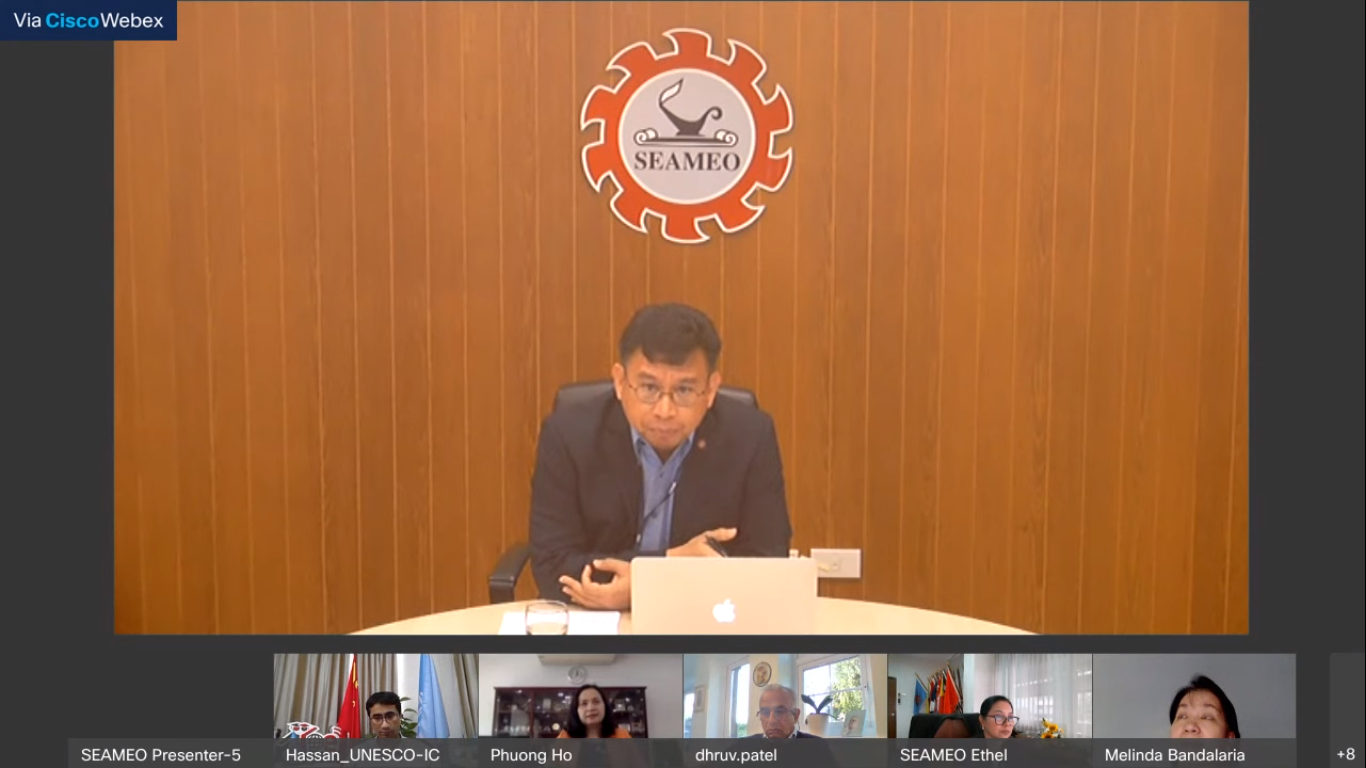Thursday 30 April 2020, SEAMEO Secretariat held a webinar (web seminar) entitled Learning Continues: Making Distance Learning, Open Education Resources, and Online Resources Matter during Covid-19 Education Disruption. This webinar was a part of the webinar series on SEAMEO’s response to Covid-19 pandemic that has been started since 29 April 2020. This activity was aired on the SEAMEO Secretariat youtube channel.
In this webinar, Dr Ho Thanh My Phuong, the Centre Director of SEAMEO RETRAC, served as moderator and the speakers were:;
- Dr Torunn Gjelsvik, the Secretary-General of International Council for Open and Distance Education (ICDE), Norway
- Mr Chor Meng Tan, the Director of Asia Pacific, Knowledge and Learning, Wiley, Singapore
- Dr Melinda Bandalaria, the Chancellor of the Phillippines Open University
- Mr Hassan Shehzad, the Programme Specialist of UNESCO-ICHEI China
- Dr Steven Mckee, the President of Worlddidac and President and Founder of Labtech International Ltd.
- Dr Dhruv Patel, the CEO and Founder of Nisai Group, UK.
In this webinar, it was explained that based on UNESCO data over 1.5 billion students and youth across 165 countries are out of school on 25 March 2020, while nearly 63 million primary and secondary school teachers were no longer in class. This is caused by the lockdown policy implemented which widens the education gap especially for the poor. In this case, a solution is expected to overcome the education gap, particularly in Southeast Asian countries.
As stated by Dr Torunn Gjelsvik that ICDE now has a #LearningTogether campaign that includes categories such as news and resources, tips for distance and online learning, and webinar series such as teaching and learning, leadership and institutional policy. Learning Together also has a free micro-course for education, copyright and also open license in the digital world which is certainly influential in this global era.
Besides, Mr Chor Meng Tan explained that there is a need for a Global Partnership: Collaborative and Coordinated Efforts to counter Covid-19. Leaders and government officials can work together with other stakeholders who play a role in the fields of Education and Health to provide healthcare, financial aids and operational support for educators and students, fund traineeship schemes, and extend flexibility on regulatory limitations for remote learning.
It is certainly very important for stakeholders to prevent and prepare for things to help in a pandemic outbreak such as this case. Not everyone has access to the internet. The existence of local partnerships and collaboration with ministries can help provide access in times of a pandemic like this. Dr Torunn Gjelsvik also added that one of the solutions is to increase the traditional sources for learning such as tv and radio especially for primary schools, furthermore being able to do work remotely could bring up a solution as in using mobile phones such as Whatsapp groups to create a place to communicate with students.
Dr Melinda also supports that with the existence of role in online learning as a strategy for rapid and mass training of teachers, free online seminars as a strategy to provide information or technology skills knowledge specific to emergency remote teaching, Open Educational Resources (OER) as content for teaching, Massive Online Open Courses (MOOCs) as OERs to train fellow trainers. But besides that, Dr Steven Mckee suggests a framework element is needed, namely student access, learning platforms about how to approach and use them, content, student skills about how to regulate online learning, and also the policies. Dr Dhruv Patel also added that online learning is a challenge for everyone, especially educators and also students, which both must prepare for the online learning transition. Not only that, but family environment factors must also help in supporting learning at home, with the holding of online learning it can expand the range of learning to marginal students. Besides, we must also prepare to face the transition back to learning in the classroom when this pandemic is over.
On the other side of all the solutions mentioned above, Mr Hassan Shehzad said that smart classroom has been implemented in several universities in Asia and Africa. This could be a bright spot going forward to fight the Covid-19 pandemic in the field of education.
This webinar is running as it should, which even though the speakers cannot meet directly with participants from various countries, the participants can ask questions via live chat. Another series of webinars related to the response in handling the Covid-19 pandemic will be continued on 07 and 14 May 2020.






